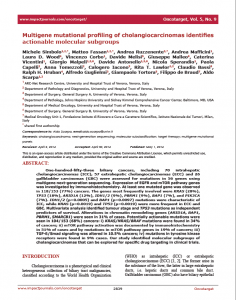A collaborative research conducted in Verona identifies multigene mutational profiling of cholangiocarcinomas
A collaborative study between the ARC-NET – applied research on cancer, the Unit of Liver Surgery, the Unit of Panceatic Surgery, and the Unity of Oncology at the University of Verona Hospital Trust assessed the mutational status of 56 cancer-related genes in 153 biliary tract cancers, using a targeted next-generation sequencing methodology. In particular, 70 intrahepatic cholangiocarcinomas, 57 extrahepatic cholangiocarcinomas and 26 gallbladder carcinomas were sequenced. The aim of this analysis was to identify molecular subgroups driving the development of personalized therapy approaches for patients affected by these neoplasms.
The study was published in Oncotarget (Simbolo M, Fassan M, Ruzzenente A, Mafficini A, Wood LD, Corbo V, Melisi D, Malleo G, Vicentini C, Malpeli G, Antonello D, Sperandio N, Capelli P, Tomezzoli A, Iacono C, Lawlor RT, Bassi C, Hruban RH, Guglielmi A, Tortora G, de Braud F, Scarpa A. Multigene mutational profiling of cholangiocarcinomas identifies actionable molecular subgroups. Oncotarget. 2014 May 15;5:2839-52).
At least one mutated gene was observed in 118/153 (77%) cancers. The genes most frequently involved were KRAS (28%), TP53 (18%), ARID1A (12%), IDH1/2 (9%), PBRM1 (9%), BAP1 (7%), and PIK3CA (7%). IDH1/2 and BAP1 mutations were characteristic of intrahepatic cholangiocarcinomas, while KRAS and TP53 were more frequent in extrahepatic cholangiocarcinomas and gallbladder carcinomas. Multivariate analysis identified tumour stage and TP53 mutations as independent predictors of survival. Alterations in chromatin remodeling genes (ARID1A, BAP1, PBRM1, SMARCB1) were seen in 31% of cases. Potentially actionable mutations were seen in 104/153 (68%) cancers: i) KRAS/NRAS/BRAF mutations were found in 34% of cancers; ii) mTOR pathway activation was documented by immunohistochemistry in 51% of cases and by mutations in mTOR pathway genes in 19% of cancers; iii) TGF-ß/Smad signaling was altered in 10.5% cancers; iv) mutations in tyrosine kinase receptors were found in 9% cases.
Thus, this study identified molecular subgroups of cholangiocarcinomas that can be explored for specific drug targeting in clinical trials.














